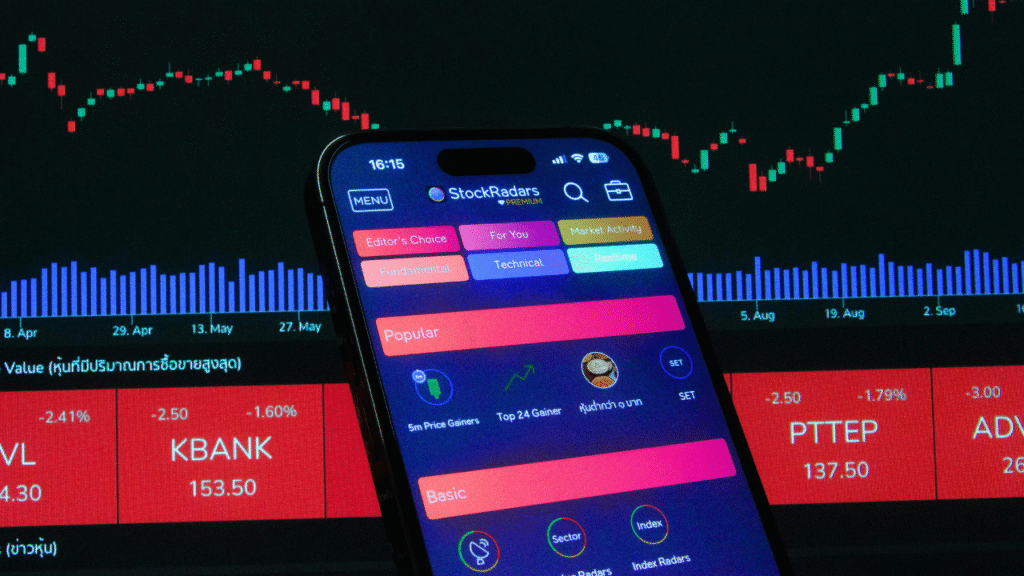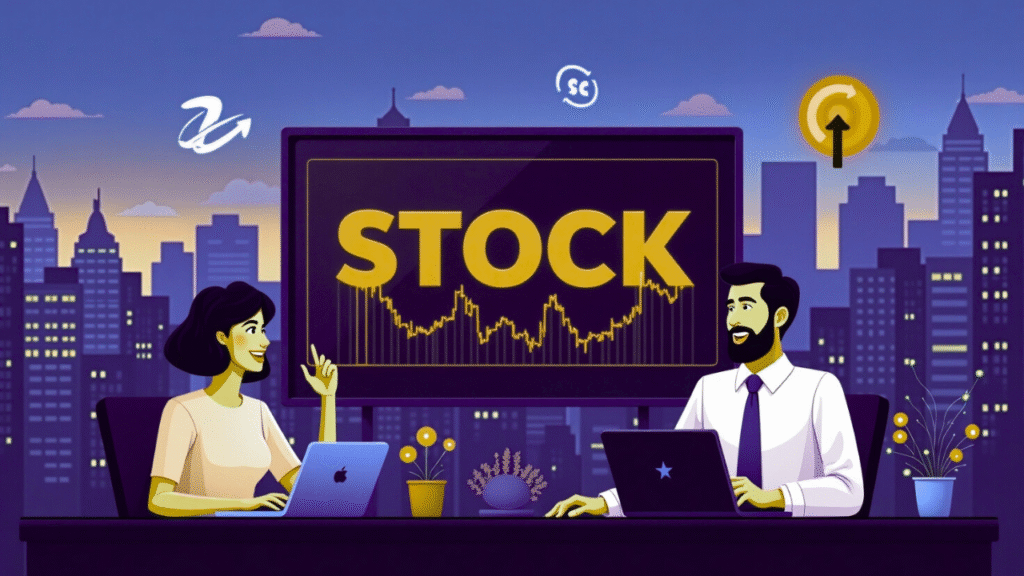What is the stock market ?

Introduction
The stock market often sounds intimidating, filled with complex jargon, flashing tickers, and news about unpredictable swings. But in reality, the concept of the stock market is far simpler than it seems. In this comprehensive article, we will break down what is the stock market in simple terms and provide the best review in 2025 of how it works, why it matters, and how you can understand it without needing a finance degree.
What Is the Stock Market in Simple Terms?
At its core, the stock market is like a giant marketplace where people buy and sell pieces of companies, known as “stocks” or “shares.” When you own a share of a company, you literally own a small slice of that company. If the company does well, your share may increase in value; if the company struggles, your share may lose value.
Think of it like this:
- You and your friends want to start a bakery.
- Instead of one person paying all the startup costs, you sell “shares” of the bakery to your friends.
- In return, they each own part of the bakery and share in its profits (or losses).
This is how companies raise money to grow while giving investors a chance to benefit.
Why Does the Stock Market Exist?
The stock market isn’t just a place where numbers go up and down—it serves a vital role in modern economies by connecting businesses that need capital with investors who want to grow their wealth.
- For companies:
- When businesses want to expand, hire more employees, invest in research, or develop new products, they often need large sums of money.
- By issuing shares on the stock market, companies can raise funds from many investors at once instead of relying solely on bank loans or private financing.
- This capital helps companies grow faster, innovate more, and compete on a global scale.
- For investors:
- The stock market gives individuals, funds, and institutions a way to put their money to work.
- Instead of sitting idle in a bank account earning minimal interest, money invested in stocks can potentially grow as companies expand and earn profits.
- Investors may earn returns through capital gains (when a stock’s price increases) and dividends (a share of company profits paid to shareholders).
- Economic benefits beyond companies and investors:
- Efficient stock markets create a steady flow of capital to productive businesses, helping entire economies grow.
- Public companies are required to disclose financial information, increasing transparency and helping investors make informed decisions.
- Stock markets also give governments insights into economic health, guiding policy decisions.
In short: Without stock markets, businesses would have to rely heavily on private lenders, venture capital, or government funding. This would limit growth opportunities and make it harder for everyday people to invest in and benefit from the success of major companies.ld have to rely solely on bank loans or private investors, limiting their ability to grow quickly. For everyday people, investing would be far less accessible.
How Does the Stock Market Work?

The stock market operates as a network of exchanges where companies and investors meet to buy and sell ownership stakes in businesses. These exchanges, such as the New York Stock Exchange (NYSE) and NASDAQ, act as highly regulated marketplaces designed to ensure fairness, transparency, and efficiency. Here’s how the process works in greater detail:
- A company decides to “go public”:
- When a company needs to raise capital to expand, develop new products, or pay off debt, it can choose to “go public.”
- This process involves creating an Initial Public Offering (IPO), where the company sells shares to institutional investors, investment banks, and the general public for the first time.
- Investment banks help set an initial price for the shares and ensure a successful launch by underwriting the offering.
- Shares are traded on stock exchanges:
- After the IPO, the company’s stock is listed on an exchange like the NYSE or NASDAQ.
- Investors—both individual and institutional—buy and sell these shares daily.
- Trading occurs electronically or via brokers, who act as intermediaries to match buyers with sellers.
- Prices fluctuate based on supply and demand:
- If more people want to buy a stock than sell it, the price rises.
- If more people want to sell than buy, the price falls.
- This tug-of-war is influenced by many factors: company earnings, industry trends, global economic conditions, news headlines, and even investor sentiment.
- The role of market makers and liquidity:
- Market makers (specialized firms) ensure there’s always a buyer and seller available, keeping trading smooth.
- Liquidity—how easily you can buy or sell a stock without drastically changing its price—makes the market efficient and stable.
- Indexes as market barometers:
- Groups of stocks, like the S&P 500 or Dow Jones Industrial Average, track overall market performance.
- These indexes help investors gauge whether the market is generally rising (a bull market) or falling (a bear market).
Common Terms Explained Simply
To understand the stock market in 2025, you’ll hear a lot of terms. Here are a few simplified:
- Stock (Share): A piece of ownership in a company.
- Dividend: A portion of profits a company pays to its shareholders.
- Bull Market: When prices are rising and investors feel optimistic.
- Bear Market: When prices are falling and investors are cautious.
- Index (like S&P 500): A group of stocks used to measure market performance.
Stock Market in 2025: What’s New?
The stock market is not static; it evolves with technology, investor behavior, and global economic shifts. In 2025, several groundbreaking developments are reshaping how people participate in and perceive investing:
- Rise of AI trading tools:
- Artificial intelligence now powers advanced trading algorithms previously available only to hedge funds.
- Retail investors have access to AI-driven portfolio analysis, risk assessment, and real-time trading recommendations.
- These tools help remove emotional decision-making and offer predictive insights based on vast datasets, including global news and economic indicators.
- Fractional shares become standard:
- Investors no longer need to save hundreds or thousands of dollars to own stock in major companies like Tesla, Amazon, or Apple.
- Fractional shares allow you to invest exactly the amount of money you have available, even if it’s just a few dollars.
- This democratization of investing encourages more participation from younger generations and those new to the market.
- Sustainable and ethical investing on the rise:
- Environmental, Social, and Governance (ESG) standards are no longer niche—they’re mainstream.
- Funds and ETFs now clearly disclose their ESG ratings, helping investors support companies aligned with their values.
- Companies with strong sustainability practices often see increased investor confidence and, in many cases, better long-term performance.
- Global accessibility through mobile platforms:
- Low-cost and commission-free trading apps are available worldwide, allowing nearly anyone with a smartphone to invest.
- Currency conversion tools and multi-market access mean investors can easily buy international stocks without navigating complex paperwork.
- Educational features built into apps help beginners learn as they go, reducing the learning curve.
Is Investing in the Stock Market Risky?
Yes but risk is part of the opportunity. Stock prices can rise and fall quickly. However, historically, the stock market has grown in value over the long term. The key is understanding:
- Short-term volatility: Prices can fluctuate daily.
- Long-term growth: Staying invested over years usually smooths out short-term swings.
- Diversification: Spreading your investments reduces risk.
How to Start Investing in the Stock Market (2025 Edition)

You don’t need to be a Wall Street expert to start investing today. The tools available in 2025 make it easier and more affordable than ever to begin building your portfolio. Here’s a more detailed step-by-step guide:
- Open a brokerage account:
- Use well-known platforms like Robinhood, E*TRADE, Fidelity, or newer AI-powered trading apps.
- Look for features like zero-commission trades, fractional share availability, and strong educational resources.
- Ensure the platform is regulated and provides good customer support.
- Decide your investment goals:
- Are you saving for retirement, planning for a large purchase, or seeking passive income?
- Short-term goals require safer, lower-risk investments. Long-term goals allow for more aggressive growth strategies.
- Write these goals down to guide your decisions.
- Start small with fractional shares or ETFs:
- Fractional shares let you invest even if a single share costs hundreds or thousands of dollars.
- ETFs (Exchange-Traded Funds) give you exposure to a wide variety of stocks in one purchase, spreading risk automatically.
- Begin with amounts you’re comfortable with—consistency matters more than size at first.
- Do your research or use automated tools:
- Learn about the companies or funds you’re investing in. Check for solid financials, stable leadership, and long-term potential.
- If research feels overwhelming, use robo-advisors. These AI-based tools build and manage a diversified portfolio tailored to your risk tolerance and goals.
- Follow credible financial news sources to stay informed about market trends.
- Stay consistent and patient:
- Make regular contributions, even small ones. Automated deposits can help.
- Avoid panic selling when markets dip—short-term fluctuations are normal.
- Review your portfolio periodically and adjust only if your goals change, not because of daily market moves.
The Best Review of the Stock Market in 2025
In 2025, the stock market is more accessible, transparent, and technology-driven than ever before. Here’s a review of its key features:
- Accessibility: Anyone with a smartphone can start investing in minutes.
- Lower barriers: No minimum balance requirements thanks to fractional shares.
- AI guidance: Smart tools help beginners avoid costly mistakes.
- Focus on ethics: Investors reward companies that care about people and the planet.
- Global reach: You can invest in companies from around the world without complex paperwork.
Conclusion
Understanding what is the stock market in simple terms isn’t as complicated as it sounds. It’s a marketplace where companies raise money and investors can grow wealth. In 2025, new technology, easier access, and ethical investing trends make it more beginner-friendly than ever.
If you’re considering investing, start small, learn the basics, and stay consistent. The stock market has its ups and downs, but with patience, it can be a powerful tool to grow your money over time. see it
